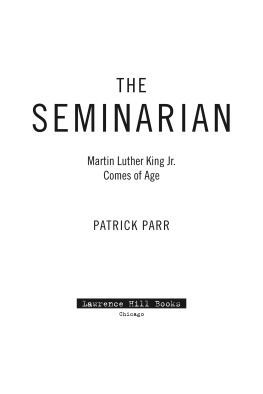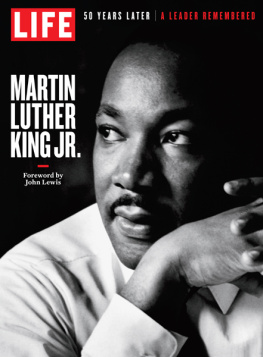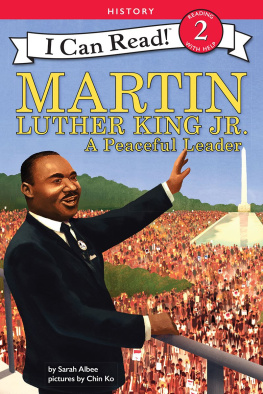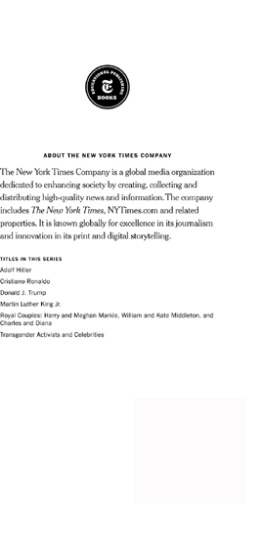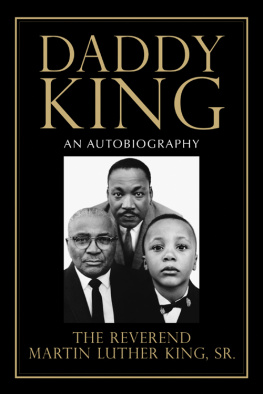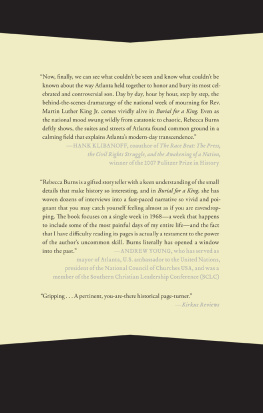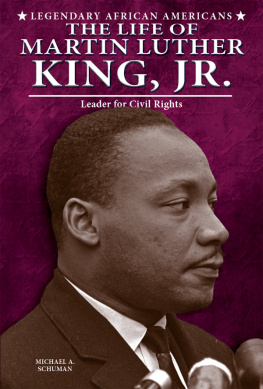Sommaire
Pagination de l'dition papier
Guide
Copyright 2018 by Patrick Parr
All rights reserved
Published by Lawrence Hill Books
an imprint of Chicago Review Press Incorporated
814 North Franklin Street
Chicago, Illinois 60610
978-0-915864-22-5
Library of Congress Cataloging-in-Publication Data
Is available from the Library of Congress.
Sketch artwork: Wayne Watson
Typesetting: Nord Compo
Printed in the United States of America
5 4 3 2 1
This digital document has been produced by Nord Compo.
For Norma Frank and
Foreword
by David J. Garrow
PATRICK PARRS The Seminarian: Martin Luther King Jr. Comes of Age is without question the most original and important book about Kings life to appear in more than a quarter century, since Keith D. Millers Voice of Deliverance: The Language of Martin Luther King, Jr., and Its Sources was published in 1992.
The depth and thoroughness of Parrs research is nothing short of astounding. To take the most striking example, over thirty years ago I discreetly published the name of Kings Crozer Seminary girlfriend, Betty Moitz, in an endnote, but the people-search technologies of the early 1980s afforded a young historian few options for finding someone whose marital surname was unknown, and Kings life from 1955 onward, not his seminary experience, was my primary focus.
Three decades later, not only did Parr find his way to Moitz and coax her to talk frankly to him about her long-ago romance, but he also carried out the difficult legwork that is the real meat of historical research: carefully reviewing the seminarys local newspaper, the Chester Times, for all its stories about life at Crozer and its mentions of King, and mining the seminarys own old academic records for the light they could shed on the content and progression of Kings coursework. In so doing, Parr has gone well beyond all prior scholars, and he offers what without doubt will always remain the utterly definitive account of Martin Luther King Jr.s life from 1948 to 1951.
Not only is this a book of exceptional and unparalleled historical richness, it is also most approachably and felicitously written. One need not be a King scholar, or a student of Protestant theology, to understand and appreciate the compelling and insightful narrative that Parr offers chapter after chapter. His detailed reconstruction of Kings academic coursework will impress the most demanding of scholars, but his always empathetic and persuasive interpretations of Kings development, personal as well as intellectual, will appeal to all interested readers of whatever background.
In addition to Betty Moitz, Parr also brings to the fore a half dozen or more other influential figures in Kings early life whom history should remember better than it has to date. His portrayal of Kings relationship with Martin Luther King Sr. is original and convincing. Chesters Rev. J. Pius Barbour stood second only to Kings father in his paternal and pastoral influence on the young preacher, and Kings fellow African American seminary classmates Walter McCall, Horace Whitaker, and Marcus Wood all receive their well-deserved due, too. Parr likewise offers the best portraits to date of Kings faculty instructors, particularly Kenneth L. Smith, and he similarly provides the best existing account of Kings intellectual forays at the nearby University of Pennsylvania.
Yet without question it is Parrs gentle, respectful, and pioneering analysis of Kings intense youthful love for Betty Moitz that will draw the most attention to this book. Thirty years ago I offered only a one-paragraph account of that romance, but, unable to find Moitz herself, I did not accord that indelible life experience more attention. Now Patrick Parr has done the seemingly impossible, reaching back across more than sixty-five years to record and recount Moitzs own memories of her relationship with King. It is a powerful and painful story, a deeply personal testament to how the racialor raciststrictures that so severely limited Americans lives in the midtwentieth century fundamentally altered the life course of even so well-advantaged a young African American as Martin Luther King Jr.
In short, The Seminarian is a work of top-notch scholarship and insightful reflection. It makes a remarkable, landmark contribution to our understanding of Martin Luther King Jr.s life, and it will forever remain on the very top shelf of all books that seek to illuminate how Kings legacy should continue to inspire all of us.
Note to the Reader
TWENTY-SIX YEARS and ten months.
Thats how old Martin Luther King Jr. was on December 5, 1955, the day Montgomery, Alabama, civic activist Rufus Lewis nominated him to be the president of the newly formed Montgomery Improvement Association. By then, King was a husband and father and a reverend with a doctorate, and Lewis saw in his Dexter Avenue Baptist pastor just the right mix to appeal to the black community, even if King seemed more like a boy than a man in appearance.
Lewiss nomination during that afternoon meeting marked a turning point: in the next twelve years King rose from relative obscurityleading the successful 381-day Montgomery bus boycott, writing the Letter from a Birmingham Jail, co-orchestrating the March on Washington, receiving the 1964 Nobel Peace Prize, and serving as the driving force behind the Voting Rights Actto become the legendary figure we now know.
The Seminarian is not about this twelve-year period in Martin Luther King Jr.s life, about which so much has already been written. Instead, it focuses on a formative time before his rise to prominencespecifically, the three years he spent studying at Crozer Theological Seminary in Chester, Pennsylvania, between 1948 and 1951. Biographers and historians have described these years briefly but never fully. In fact, they have detailed very little about Kings day-to-day life pre-Montgomery, so much of this book, laid out chronologically, term by term, will be new information not just to the general reading public but also to researchers eager to learn more about Kings life before the boycott. It will explore fully for the first time the contributions of many figures who contributed to Kings development as a young manindividuals such as Rev. J. Pius Barbour, Walter McCall, Horace Whitaker, Betty Moitz, Kenneth Smith, and Marcus Wood.
Throughout the book, I refer to King as ML, the nickname by which his family and most of his friends called him. Though he also went by other names, I chose to use ML because it suggests a more informal and personal perspective on King while also evoking his common appellation MLK. This is in keeping with my larger goal of showing the connections between the young man he was at the time and the icon he would eventually become.
Some readers may be surprised by exactly how young ML was when he entered his first year at Crozer, a college graduate at only nineteen years of age. This is because he skipped the ninth and twelfth grades of high school, due not to incredible academic performance but to fortuitous timing. When the Atlanta Laboratory School closed down in his ninth-grade year, thirteen-year-old ML was allowed to enter Booker T. Washington High School as a tenth-grader. And by the time he finished the eleventh grade, World War II had caused such a downturn in college enrollment that the president of Morehouse College, Benjamin E. Mays, decided to take advantage of a recent Georgia state law and accept promising high school juniors. King passed the admissions test and became an undergraduate at Morehouse at the age of fifteen, while still living at home. He graduated at nineteen, and the following fall he began his studies at Crozer Theological Seminary.

